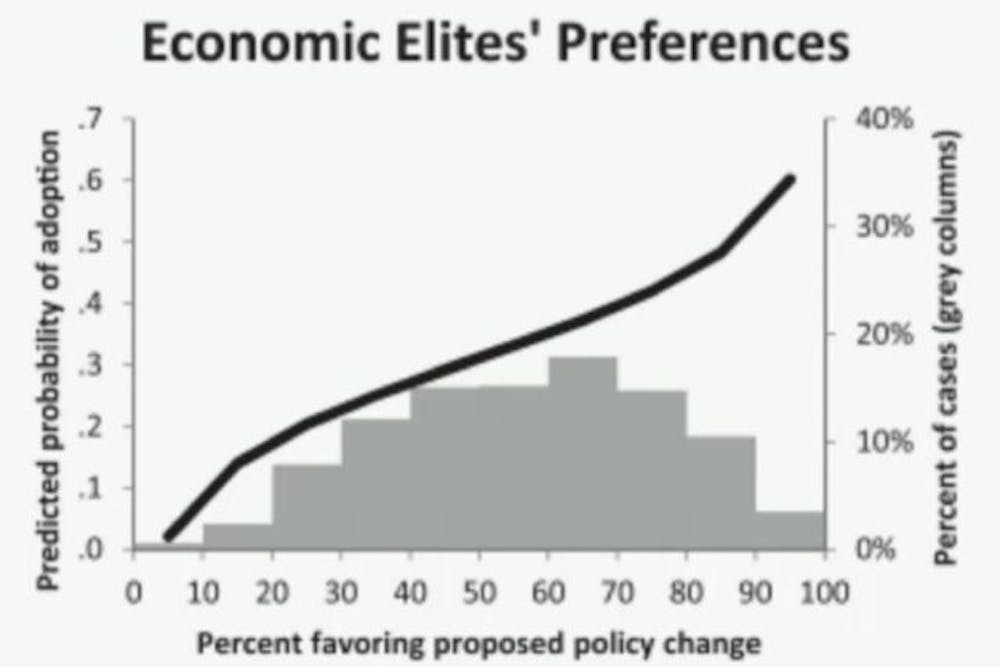Former President Jimmy Carter recently called the United States “an oligarchy with unlimited political bribery.” As a result of the Supreme Court’s 2010 Citizens United ruling, he claims, “we've just seen a complete subversion of our political system as a payoff to major contributors, who want and expect and sometimes get favors for themselves after the election's over.”
The vast majority of the $388 million raised in the 2016 presidential campaign has been channeled through “super PACs,” which can accept limitless campaign contributions from anonymous donors. Federal Election Commission data show that fewer than 400 families and their businesses raised almost half of this $388 million. Charles G. and David H. Koch alone plan to spend $889 million this election cycle. That sum is 43 percent of the combined fundraising efforts of Obama and Romney’s respective 2012 campaigns, national parties and associated “super PACs” in 2012. These two brothers, with a few hundred of the richest American families, plan to buy a greater stake in the electoral process than that of the 320 million other Americans.
As long as elections are bought and sold by billionaires, public policy will not be responsive to the needs of everyday Americans and their families. When throngs of Wall Street lobbyists stalk the halls of Congress at the same time as billionaires buy elections, it is no surprise the economy is stacked in favour of those at the top. The top 0.1 percent of Americans own almost as much wealth as the bottom 90 percent. As a result of lawmakers becoming beholden to their campaign contributors, in the richest country in the history of the world roughly 20 percent of children live in poverty. While the United States leads the developed world in the number of billionaires, it also leads in homelessness.
Republicans, who disingenuously profess concern over the national debt, have vowed to give the top 0.2 percent a $269 billion tax break by abolishing the estate tax which has, in some form, existed in America since 1797. Establishment Democrats like Hillary Clinton pay lip service to serious Wall Street reform but oppose reestablishing the Glass-Steagall Act. The bill, passed in 1933 in response to the Great Depression, established a firewall between commercial and investment banks that safeguarded everyday Americans’ savings from reckless speculation but perhaps unsurprisingly, was repealed less than a decade before the financial crisis of 2007-8. Both parties’ legislators now work to serve their campaigns’ beneficiaries at the expense of the public they have a sacred duty to serve.
The absorption of both wealth and political power by the few has, by definition, propelled the country down the road to oligarchy. The promise of a “government of the people, by the people, for the people” is under threat. When both the economy and political process are rigged to favor those at the top, change has to come from outside our governing institutions — from the grassroots. The only way for the people to reverse the nation’s slide toward oligarchy is to turn legislators’ heads by assembling a vocal, organized grassroots movement, with numbers in the millions and in all 50 states, that advocates for a campaign finance amendment as the first remedy to the country’s oligarchic bent.
Sen. Bernie Sanders (I-VT) is the only presidential candidate who has made inequality the animating theme of his candidacy. While Secretary Clinton speaks to inequality with little more than poll-tested platitudes and tepid policy prescriptions, Sanders has pushed campaign finance reform to the front and center of his campaign. While Clinton has raked in millions from Wall Street, Sanders refuses to take “super PAC” money, preferring to place his fundraising hopes with the grassroots.
As I write, Sanders’ rallies, in the last few days, have drawn crowds of 15,000, 28,000 and 27,500 in Seattle, Portland and Los Angeles, respectively (far more than Obama drew eight years ago). His speeches are characterized less by soaring rhetoric and more by the dissection of data to expose the injustices we know exist but rarely hear, but that distinction epitomizes his appeal: Sanders speaks truth to power by laying bare inequality in all its forms.
Many people, myself included, have said that, barring exceptional circumstances, Clinton will win the nomination and the best we can hope for is to choose the lesser of two evils come the general election. But the circumstances are exceptional: we are at a crossroads in history where the paths of democracy and oligarchy diverge. If this campaign cycle, like others before it, is defined by billionaire donors and scaremongering narratives, the descent toward oligarchy will only accelerate. But if the election is determined by a robust debate of the most important issues — income inequality, campaign finance reform and climate change — the grassroots can take back the political process and reinvigorate the promise of democracy in America.
Ben Rudgley is an Opinion columnist for The Cavalier Daily. He can be reached at b.rudgley@cavalierdaily.com.







